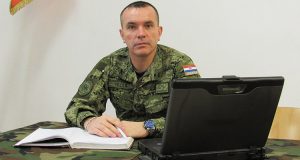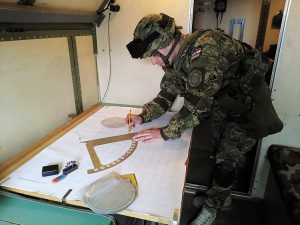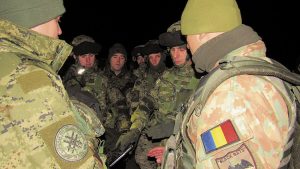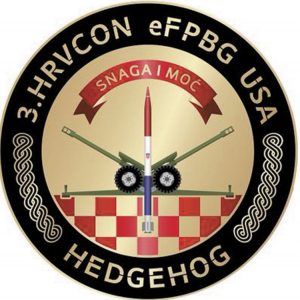On the day of the international recognition of the Republic of Croatia a third of…
Working in an International Environment Enriches Every Individual
 The 3rd Croatian Contingent was deployed to the “Bemowo Pieskie” Training Range in North-eastern Poland in October, taking over the tasks there from the previous contingent. These tasks are primarily related to joint training with Battle Group Poland, the goal which is to raise interoperability among allies. Battle Group Poland is one of four battle groups that present a specific implementation of NATO’s concept of Enhanced Forward Presence, which are deployed on its eastern borders, in Lithuania, Latvia, Estonia and Poland.
The 3rd Croatian Contingent was deployed to the “Bemowo Pieskie” Training Range in North-eastern Poland in October, taking over the tasks there from the previous contingent. These tasks are primarily related to joint training with Battle Group Poland, the goal which is to raise interoperability among allies. Battle Group Poland is one of four battle groups that present a specific implementation of NATO’s concept of Enhanced Forward Presence, which are deployed on its eastern borders, in Lithuania, Latvia, Estonia and Poland.
The United States of America is the leading nation in Battle Group Poland. Apart from Croatian soldiers, the group is also comprised of members of the armed forces of Romania and the United Kingdom. The Battle Group was added to the 15th Mechanized Brigade Giżycko. Together, these two troops make up a unique multinational coalition with a clear task: to increase the security of citizens on the NATO’s eastern border.
The 3rd Croatian Contingent in eFBPG-USA is comprised of 80 members, four of which are female. The core of the contingent is made up of members of the Mixed-Artillery Battalion of the Guards Mechanized Brigade of the Croatian Army, along with the Vulkan (Volcano) MLR Battery. Their task is to provide fire support to the battle group’s manoeuvring troops in joint training sessions. The members of the Vulkan MLR Battery as well as the personnel employed in Battle Group Poland’s command are a part of NATO’s command and control system (C2). The national command and control system consists of a Military Police team and the National Support Element. The Military Police conducts everyday military police tasks such as maintaining order, imposing compliance with the rules of transport, reconnoitring and overseeing traffic and transfer points. The National Support Element logistically supports the contingent’s activities, co-ordinates health support and secures communications and information support as well as pastoral care.
As a staff officer employed as a Public Affairs Officer in the 3rd Croatian Contingent, one of my main duties is to present the work of Croatian soldiers in the battle group’s international climate. After more than a month in the area of operation in Poland, I formed some impressions of living, working and collaborating with our allies. At the training ground almost 1300 km away from home, I became aware of the complexity and the importance of our joint task. Wishing to inform the Croatian public about the Croatian soldiers’ activities outside of their homeland, I spoke with the Commander of the 3rd Croatian Contingent in eFPBG-USA Captain Željko Trček.
What are your tasks as the commander of the Croatian contingent in Poland?
My main task is to plan our activities pursuant to the concept of the tasks given to us and to the ideas of the superior commander. Also, I plan, prepare, supervise and command over the execution of the tasks and co-ordinate my contingent’s activities with those of other troops in Battle Group Poland. Aside from these traditional military tasks, I also represent the Armed Forces of the Republic of Croatia and Croatia’s interests in front of international bodies.
 I am not only obliged to respect NATO’s command and control (C2) structure, but I also have to report to my superiors in the Republic of Croatia on the level of the national command and control (C2) system. I communicate with them every day and co-ordinate activities related to the life and work of Croatian soldiers in Poland.
I am not only obliged to respect NATO’s command and control (C2) structure, but I also have to report to my superiors in the Republic of Croatia on the level of the national command and control (C2) system. I communicate with them every day and co-ordinate activities related to the life and work of Croatian soldiers in Poland.
Apart from that, I regularly keep in touch with the Republic of Croatia’s military attaché in Poland, with whom I arrange the protocol and other details during the visits of various delegations. Together, we also plan the civilian and military collaboration with the local community, which first and foremost includes the presentation of Croatian cultural and historical values to the people of Poland.
What does your working day look like?
For all Croatian soldiers, including me, the day begins at 6 a.m. and ends at 5 p.m. I get up, wash up, have breakfast, train, eat lunch, exercise and eat dinner. Apart from that, I attend meetings on the level of the battle group and the training range’s command every day. I also meet up with other commanders when we have to co-ordinate the visit of our allies’ superior commanders. Although my daily schedule is packed, I try to visit our soldiers on the field as often as possible and see for myself how their training is progressing. At the end of each working day, I hold a meeting in which I co-ordinate the next day’s activities with all constituents of our contingent. In effect, that means that my working day sometimes ends at 10 p.m.
After almost two months, has your stay in Poland met your expectations?
Already during initial reconnaissance in September, I felt that our stay here could not and would not leave us with nothing more than the feeling of pleasure because of a job well done. After almost two months in Poland, I am sure of that. I think that we have fantastically fit into our battle group in Enhanced Forward Presence. We quickly reached the necessary level of initial readiness, participated in several joint training sessions with our allies, set up a fantastic collaboration with nations inside the battle group and the host nation as well as confirmed our operational readiness with the recently conducted rocket firing. I believe we shall continue enriching our stay here in the same rhythm every day.
 How would you grade the practical collaboration with other constituents in the battle group?
How would you grade the practical collaboration with other constituents in the battle group?
The practical collaboration is good and has been on the increase since we have arrived in the area of the operation. We actively co-operate with all nations on a daily basis. Croatian soldiers have participated in an infantry firing organized by the Romanian Armed Forces. For the younger members of the contingent, that was an opportunity to use the AK-47 assault rifle, the Beretta pistol and the RPG-7 grenade launcher for the first time and to test their shooting capabilities against their Romanian, American and British colleagues.
The British Armed Forces have organized a course of survival in winter conditions, which was attended by one of our men. Since at the time of the course the temperatures in this area were below zero, the participants of the course got to experience it to the fullest extent. I want to add that the Croatian participant successfully finished the course. He will conduct such training with other members of the contingent and pass his knowledge onto them in that way.
We established a collaboration with our American colleagues during the recently conducted rocket firing exercise. The joint training of the Croatian and American Fire Support Teams was conducted with the help of the RQ-11 Raven unmanned aerial vehicle. In this way, we could see what was happening with our target in real time. Experience acquired in such a way if of immense value. Our collaboration with the allies was also witnessed by the Commander of the Croatian Army Major General Siniša Jurković, the Republic of Croatia’s Military Attaché in Poland Colonel Jugoslav Jozić and the Senior Enlisted Leader of the Croatian Army Command Sergeant Major Dario Rosić.
Taking into account all activities conducted with our partners so far, how would you grade the Croatian soldiers’ compatibility and readiness in comparison with other international armed forces?
As far as artillery as a branch is concerned, the application of joint publications AArtyP-1 and AArtyP-5 began shortly after the Homeland War. Although both publications went through minor amendments in the years that followed, they have been used in the Croatian Armed Forces’ mixed-artillery troops for a long time and their compatibility is undeniable. The call for fire has been standardized intro full detail, so that there are no reasons why a country in need of fire support should not receive it when and where it needs.
As far as readiness is concerned, the Croatian Armed Forces have shown countless times that they can handle all tasks, not matter what the weather or territorial conditions are. The same is true in Poland. Prior to the deployment to the area of operation, the entire contingent went through a certification procedure. We were deemed ready for combat and continue to be so.
 In your opinion, how can such experiences be useful to the Croatian Armed Forces?
In your opinion, how can such experiences be useful to the Croatian Armed Forces?
First of all, working in an international environment can enrich every individual, especially those commanders who work in such an environment on a daily basis and who are directly involved in the decision-making process. Further, one can acquire experiences in different fields, not just in the military field. For example, each of us will make new acquaintances and friends. Also, we have an opportunity to improve our knowledge of English and to learn the basics of Polish; our hosts have taken care of that by starting a Polish course. In everyday communication with foreigners you can learn a lot about their history and culture, but also teach them more about Croatia; we use every opportunity we get to do so. What is more, we can use military equipment and technology which we had previously seen only on television.
I believe that everything seen and experienced in the area of operations will have an effect on the further development of the Croatian Armed Forces as a whole and each of its members. There are countless advantages to such experiences.
The course of the pre-deployment activities, your stay here for the first two months and the way you command the contingent and ensure that all the tasks are executed perfectly tell me that you are very experienced. How long have you been in the Croatian Armed Forces and why did you choose that career?
I first came in touch with the Croatian Armed Forces in the summer of 1991. I was still underage when I joined the Civil Defence units and kept guard in my hometown of Generalski Stol, which was attacked by the Yugoslav People’s Army and the local Serbian population. I first had to finish secondary school, so I only enlisted in 1993, as an 18-year-old. During the Homeland War, I served in the 111th Brigade of the Croatian Armed Forces Rijeka, the 137th Brigade of the Croatian Armed Forces Duga Resa and the 1st Guards Brigade Tigrovi (Tigers).
Honestly, I did not think at the time that serving in the army would become my life’s mission. To put it simply, you do not think that you would spend your whole life as a soldier in times of war. I have been in artillery since the start of my military career. I started as an attendant and later held a number of posts, from a bombardier to the commander of a battery. Currently, I am the Deputy Commander of the Artillery Battalion of the Guards Mechanized Brigade. I have almost 26 years of active military service under my belt.
This is not your first mission, as you had previously been to Afghanistan. What were your impressions of that country?
My first mission was ISAF and I was in Afghanistan from December 2011 to July 2012. I was a part of an artillery team which was in charge of training the Afghan National Army’s cannoneers. I was also a battery commander’s instructor at the Kabul Military Training Centre.
Although a lot of time has passed since then, my memories are still vivid. We were located at 1800 m above sea level and that winter in Afghanistan was the coldest one in the preceding decade. There was a period of 44 days when the temperature was between -17 and -25 degrees Celsius. In spite of such cold weather, the ANA’s members trained every day and were interested in learning. I could write a whole book about my impression of life there. Trust me, nothing can prepare you for the things that await you there. This rotation is also a winter one, but I hope it will not be as cold as the one in Afghanistan.
How did you celebrate Christmas here in the north of Poland, away from your families?
Joy, peace, light, togetherness, presents and family gathering – these are the values typically associated with Christmas. External symbols such a lit up Christmas tree or lit up lanterns have brought peace and warmth in our hearts and have helped us face the fact that we are away from our loved ones. Some members of the contingent are spending the holiday season away from home for the first time in their lives, but the older and more experienced members have experienced that numerous times. However, since we are one big family here, the beauty of Christmas gave a whole new meaning to our stay here.
At the end, on behalf of the 3rd Croatian Contingent in eFPBG-USA, I want to wish all members of the Croatian Armed Forces and all citizens of the Republic of Croatia a merry Christmas and a happy new year.
Interview by MIRNA BAJČETIĆ ŠIJANSKI
Photo by 3RD CROATIAN CONTINGENT, eFPBG-USA
